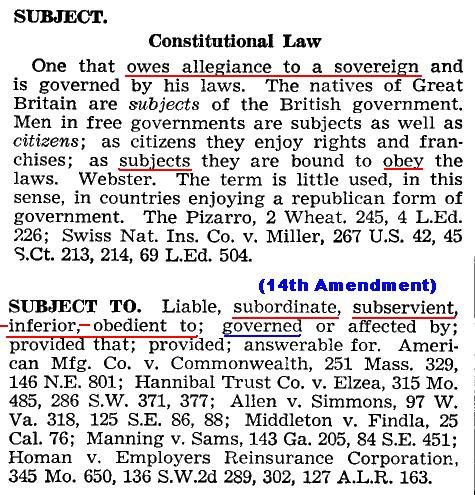Real0ne
Posts: 21189
Joined: 10/25/2004
Status: offline

|
quote:
ORIGINAL: pghays04
Surely with the collective medical knowledge in this country we should be able to come to a reasonable conclusion as to when constitutional rights should begin. I personally believe it is before the cord is cut, roughly about the time the fetus would survive outside the womb.
it has nothing to do with that.
this shit goes deep!
ever wonder where those crotch rots in office get their immunity from?
Here is the often expressed understanding from the United States Supreme Court, that "in common usage, the term "person" does not include the Sovereign, statutes employing the person are ordinarily construed to exclude the Sovereign." Wilson v. Omaha Tribe, 442 U.S. 653, 667 (1979) (quoting United States v. Cooper Corp., 312 U.S. 600, 604 (1941)). See also United States v. Mine Workers, 330 U.S. 258, 275 (1947).
The idea that the word "person" ordinarily excludes the Sovereign can also be traced to the "familiar principle that the King is not bound by any act of Parliament unless he be named therein by special and particular words." Dollar Savings Bank v. United States, 19 Wall. 227, 239 (1874). As this passage suggests, however, this interpretive principle applies only to "the enacting Sovereign." United States v. California, 297 U.S. 175, 186 (1936). See also Jefferson County Pharmaceutical Assn., Inc. v. Abbott Laboratories, 460 U.S. 150, 161, n. 21 (1983). Furthermore, as explained in United States v. Herron, 20 Wall. 251, 255 (1874), even the principle as applied to the enacting Sovereign is not without limitations: "Where an act of Parliament is made for the public good, as for the advancement of religion and justice or to prevent injury and wrong, the king is bound by such act, though not particularly named therein; but where a statute is general, and thereby any prerogative, Right, title, or interest is divested or taken from the king, in such case the king is not bound, unless the statute is made to extend to him by express words." U.S. Supreme Court Justice Holmes explained:
"A Sovereign is exempt from suit, not because of any formal conception or obsolete theory, but on the logical and practical ground that there can be no legal Right as against the authority that makes the law on which the Right depends." Kawananakoa v. Polyblank, 205 U.S. 349, 353, 27 S. Ct. 526, 527, 51 L. Ed. 834 (1907).
It will be sufficient to observe briefly, that the Sovereignties in Europe, and particularly in England, exist on feudal principles. That system considers the prince as the Sovereign, and the people as his subjects; it regards his person as the object of allegiance, and excludes the idea of his being on an equal footing with a subject, either in a court of justice or elsewhere. That system contemplates him as being the fountain of honor and authority; and from his grace and grant derives all franchise, immunities and privileges; it is easy to perceive that such a Sovereign could not be amenable to a court of justice, or subjected to judicial control and actual constraint. It was of necessity, therefore, that suability, became incompatible with such Sovereignty. Besides, the prince having all the executive powers, the judgment of the courts would, in fact, be only monitory, not mandatory to him, and a capacity to be advised, is a distinct thing from a capacity to be sued. The same feudal ideas run through all their jurisprudence, and constantly remind us of the distinction between the prince and the subject. No such ideas obtain here(speaking of America): at the revolution, the Sovereignty devolved on the people; and they are truly the Sovereigns of the country, but they are Sovereigns without subjects (unless the African slaves among us may be so called) and have none to govern but themselves; the citizens of America are equal as fellow citizens, and as joint tenants in the Sovereignty.Chisholm v. Georgia (February Term, 1793) 2 U.S. 419, 2 Dall. 419, 1 L.Ed 440.

"The individual may stand upon his constitutional Rights as a citizen. He is entitled to carry on his private business in his own way. His power to contract is unlimited. He owes no such duty [to submit his books and papers for an examination] to the State, since he receives nothing therefrom, beyond the protection of his life and property. His Rights are such as existed by the law of the land [Common Law] long antecedent to the organization of the State, and can only be taken from him by due process of law, and in accordance with the Constitution. Among his Rights are a refusal to incriminate himself, and the immunity of himself and his property from arrest or seizure except under a warrant of the law. He owes nothing to the public so long as he does not trespass upon their Rights." Hale v. Henkel, 201 U.S. 43 at 47 (1905).
this is so funny!
you dont control this country, you never did and you never will. They do!
welcome to lower canada!
you cannot be a person until you are born period.
per means one and of course son means in this case child.
you dont have a child until it hits the table.
if the government has jurisdiction over the fetus then you are truly owned and the property of the state.
< Message edited by Real0ne -- 4/8/2012 12:52:04 AM >
_____________________________
"We the Borg" of the us imperialists....resistance is futile
Democracy; The 'People' voted on 'which' amendment?
Yesterdays tinfoil is today's reality!
"No man's life, liberty, or property is safe while the legislature is in session
|

 Profile
Profile




 New Messages
New Messages No New Messages
No New Messages Hot Topic w/ New Messages
Hot Topic w/ New Messages Hot Topic w/o New Messages
Hot Topic w/o New Messages Locked w/ New Messages
Locked w/ New Messages Locked w/o New Messages
Locked w/o New Messages Post New Thread
Post New Thread